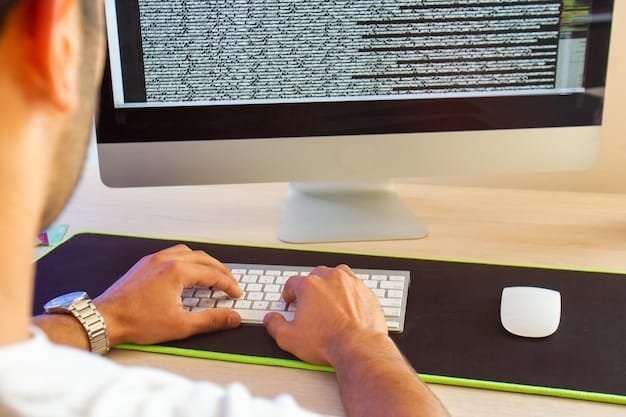Smart Contract Security Audits: US Best Practices to Prevent Exploits

Smart contract security audits are crucial for identifying vulnerabilities and preventing exploits on US-based blockchain platforms. These audits involve rigorous testing and analysis to ensure the code’s security, reliability, and adherence to best practices, safeguarding valuable assets and user trust.
Smart contracts are revolutionizing industries, but their security is paramount, especially on US-based blockchain platforms. Smart contract security audits: best practices for preventing exploits on US-based blockchain platforms are essential to identifying and mitigating vulnerabilities before they can be exploited, safeguarding digital assets and maintaining user confidence.
Understanding the Importance of Smart Contract Security Audits
Smart contracts are self-executing agreements written in code, and their immutability makes security audits critical. A single vulnerability can lead to significant financial losses and reputational damage. Understanding the necessity of these audits is the first step in securing blockchain applications.
Why Audits are Non-Negotiable
Smart contract audits are not simply a “nice-to-have”; they are a fundamental requirement for any blockchain project operating in the US. The regulatory landscape is evolving, and demonstrating due diligence in security is vital for compliance and investor protection.
- Prevent Financial Losses: Exploits can result in the draining of funds from wallets and smart contracts.
- Maintain User Trust: Users are more likely to engage with platforms that demonstrate a commitment to security.
- Ensure Regulatory Compliance: As blockchain regulations evolve, audits provide evidence of security measures.
The stakes are high, and the consequences of neglecting security audits can be devastating. Proactive measures, such as comprehensive audits, are the best defense against potential attacks.

Key Elements of a Comprehensive Smart Contract Audit
A thorough smart contract audit involves a combination of automated and manual techniques. The audit team must possess expertise in blockchain technology, programming languages, and cybersecurity best practices. The goal is to identify vulnerabilities and provide actionable recommendations for remediation.
Automated Analysis Tools
Automated tools can quickly scan code for common vulnerabilities, such as integer overflows, reentrancy attacks, and timestamp dependencies. These tools provide a baseline assessment, highlighting areas that require further scrutiny.
Manual Code Review
Manual code review involves a line-by-line examination of the smart contract code by experienced auditors. This process uncovers complex vulnerabilities that automated tools may miss. Common manual review techniques include:
- Control Flow Analysis: Examining the program’s execution paths to identify potential issues.
- Data Flow Analysis: Tracking how data is used and transformed throughout the contract.
- Business Logic Verification: Ensuring the contract accurately implements the intended functionality.
A blend of automated and manual techniques provides the most comprehensive assessment of a smart contract’s security posture, ensuring no stone is left unturned.
Best Practices for Selecting an Audit Firm in the US
Choosing the right audit firm is crucial for the success of the audit process. Not all audit firms are created equal, and selecting one with the right expertise and experience is essential. Key considerations include the firm’s reputation, team qualifications, and previous track record.
Evaluating Credentials and Experience
Consider the following when evaluating potential audit firms:
- Certifications: Look for certifications such as Certified Information Systems Security Professional (CISSP) or Certified Ethical Hacker (CEH).
- Industry Reputation: Research the firm’s reputation within the blockchain community.
- Case Studies: Review case studies and testimonials to assess the firm’s capabilities.
Asking the Right Questions
Prepare a list of questions to ask potential audit firms:
- What is your approach to smart contract audits?
- What types of vulnerabilities do you typically find?
- Can you provide references from past clients?
The selection process should be thorough and deliberate. Choosing the right audit firm can make all the difference in securing your smart contract.
Addressing Common Smart Contract Vulnerabilities
Smart contracts are susceptible to a variety of vulnerabilities, each posing unique risks. Understanding these vulnerabilities is crucial for developers and auditors alike, enabling them to implement effective security measures and mitigate potential exploits.
Reentrancy Attacks
Reentrancy attacks occur when a contract makes an external call to another contract before updating its internal state. This allows the external contract to make repeated calls back to the original contract, potentially draining its funds.
Integer Overflows and Underflows
Integer overflows and underflows occur when a calculation results in a value that exceeds the maximum or falls below the minimum value that can be stored in an integer variable. This can lead to unexpected behavior and vulnerabilities.
Timestamp Dependencies
Timestamp dependencies occur when a contract relies on the timestamp of a block for critical decisions. This can be manipulated by miners, leading to potentially unfair or malicious outcomes.
Being aware of these common vulnerabilities and implementing appropriate safeguards is essential for building secure smart contracts that can withstand potential attacks.
Developing a Security-First Mindset in Blockchain Development
Building secure smart contracts requires a security-first mindset throughout the entire development lifecycle. This includes writing secure code, conducting thorough testing, and staying up-to-date with the latest security best practices. Incorporating security measures from the outset helps minimize vulnerabilities and reduce the risk of exploits.
Implementing Secure Coding Practices
Secure coding practices are the foundation of smart contract security. These practices include:
- Input Validation: Validating all user inputs to prevent malicious data from entering the contract.
- Access Control: Implementing strict access control mechanisms to limit who can perform certain actions.
- Error Handling: Implementing robust error handling to gracefully handle unexpected situations.
Conducting Regular Security Training
Keeping developers and auditors up-to-date with the latest security threats and best practices is crucial. Regular security training helps raise awareness and ensures everyone is equipped to identify and address potential vulnerabilities.
Adopting a security-first mindset is an ongoing process that requires continuous learning, adaptation, and vigilance. By prioritizing security at every stage of development, blockchain projects can build robust and resilient smart contracts that protect user assets and maintain trust.
The Future of Smart Contract Security in the US
The future of smart contract security in the US is evolving rapidly, driven by technological advancements, regulatory changes, and increasing awareness of the importance of security. As blockchain technology continues to mature, the demand for robust security measures will only increase.
Emerging Technologies and Techniques
Emerging technologies and techniques are enhancing smart contract security in the US. These include:
- Formal Verification: Using mathematical techniques to prove the correctness of smart contract code.
- AI-Powered Security Tools: Leveraging artificial intelligence to identify and predict potential vulnerabilities.
Regulatory Landscape and Compliance
The regulatory landscape for blockchain technology in the US is constantly evolving. As regulations become more defined, compliance will become increasingly important for smart contract security. Audit firms must stay abreast of these changes and ensure their practices align with regulatory requirements.
The smart contract security landscape will continue to evolve, requiring a collaborative approach between developers, auditors, and regulators to ensure the safety and reliability of blockchain applications in the US.
| Key Aspect | Brief Description |
|---|---|
| 🛡️ Audit Importance | Critical for preventing financial losses and maintaining user trust in US blockchain platforms. |
| 🔍 Audit Elements | Combines automated tools and manual review for comprehensive vulnerability detection. |
| 🤝 Firm Selection | Choose firms with relevant certifications, a strong reputation, and positive client feedback. |
| 🚀 Future Trends | Emerging technologies like formal verification and AI enhance security. |
Frequently Asked Questions
A smart contract security audit is a comprehensive review of a smart contract’s code to identify potential vulnerabilities and ensure it functions as intended, minimizing the risk of exploits and financial losses.
Audits are crucial in the US due to evolving regulations and the need to protect investors and users. Demonstrating a commitment to security through audits is essential for compliance and maintaining trust.
Audits commonly reveal vulnerabilities like reentrancy attacks, integer overflows, timestamp dependencies, and other coding errors that could be exploited by malicious actors to compromise the contract.
Choose a firm with relevant certifications, a strong industry reputation, and positive client testimonials. Ensure they have experience in auditing smart contracts on the specific blockchain platform you use.
The future involves emerging technologies like formal verification and AI-powered security tools. As regulations evolve, compliance will be increasingly important, requiring continuous adaptation to new threats.
Conclusion
Smart contract security audits: best practices for preventing exploits on US-based blockchain platforms are not just a precautionary measure, but a necessity for maintaining trust, ensuring regulatory compliance, and safeguarding digital assets. By prioritizing security and adopting a proactive approach, blockchain projects can build robust and resilient smart contracts that protect user assets and foster innovation in the ever-evolving digital landscape.





